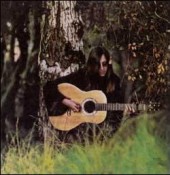A singer/songwriter with deeply religious overtones and a penchant for the occult, Judee Sill is one of rock's more interesting and lesser-known stories. The daughter of old Hollywood money, Sill's father died when she was just a child, and her brother died in a car crash soon after, leading to a bleak outlook on life that she expressed in an arty, disaffected attitude. She disliked her stepfather and condemned her mother for remarrying; as a quiet form of vengeance, Sill set out to travel America and live a rambling lifestyle. She had been interested in playing music although was seemingly not serious about it until she began her travels, playing small coffee houses and dives for fun. She and her friends had always been into drugs for recreational and exploratory use, but as Sill stayed out on the road she began using heroin regularly, eventually developing a hundred-fifty-dollar-a-day habit. It was rumored (partly by Sill herself, although never confirmed) that she at one time had to prostitute herself in order to support her addiction.
In the late '60s Sill was busted for heroin possession and served three months in prison, during which time she was able to kick her habit; when she returned to the world at large, she focused solely on making music. She returned to Los Angeles where, through her Hollywood connections, she was introduced to David Geffen. Geffen was in the process of creating Asylum Records, which was to focus exclusively on non-rock material. Taken by Sill's abilities as a writer and performer, Geffen immediately signed her to Asylum; her self-titled debut was also the first official release for the new label.
It was through Geffen that she met Graham Nash, who quickly became a fan, and produced the first single for her album, "Jesus Was a Cross Maker." The rest of Judee Sill was orchestrated and produced by Bob Harris, Sill's ex-husband. Judee Sill was released in 1971 to immediate acclaim. Lushly orchestrated, the album featured Sill's voice in multiple overdubs, often in a four-part chorale or fugue. The album fit in well with the light rock/folk-rock underpinnings of what came to be known as the "Laurel Canyon sound" associated with other female singer/songwriters such as Carole King and Joni Mitchell (Mitchell, also signed to Asylum, was at work on Ladies of the Canyon at the time, which was also produced by Bob Harris). A tour as the opening act for Nash and David Crosby exposed her intimate songwriting and skillful guitar playing to a larger audience, but her record failed to make much of an impact, despite the somewhat heavy airplay of "Jesus Was a Cross Maker." A self-professed perfectionist, one song could often take her a year to write, and it wasn't until late 1972 that Sill returned to record and release her second and last album, Heart Food. It too received enthusiastic reviews but did poorly commercially. Sill took over the chores of both orchestrating and arranging Heart Food, with the production relying more heavily on multilayered strings and lush expanse. Unable to draw a sizable crowd yet unwilling to play as a support act, Sill's name and moderate fame both receded, and she disappeared from view entirely. Rumors abound as to what happened next, although it is definitely known that she returned to her heroin addiction as well as becoming heavily involved with cocaine. Graham Nash has said that he learned as early as 1974 that Sill had died of an overdose, a claim that would later prove to be incorrect, but considering how closely the two had worked only a few years earlier it does illustrate just how completely Sill had dropped out by this time. She never managed a second return from the abyss and Judee Sill, age 35, died of a drug overdose in November of 1979.
